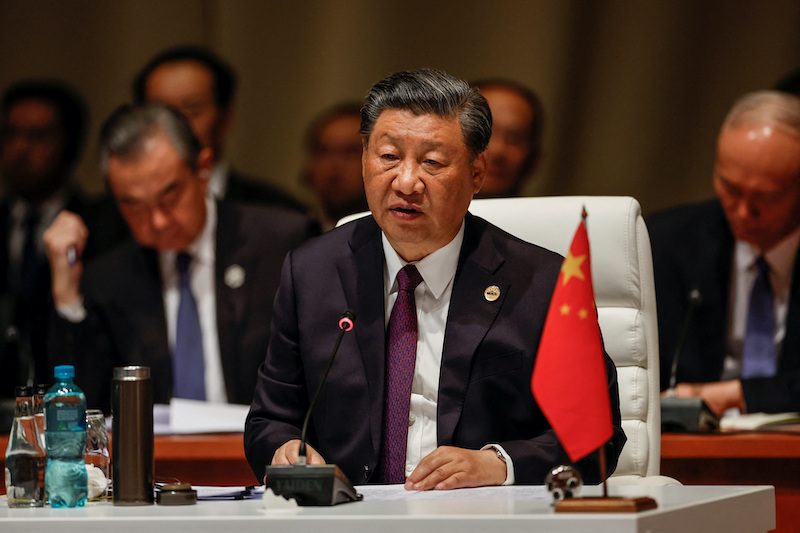Officials in China have conceded that the results of its four-day economic summit this week is a long list of goals that contain “many complex contradictions.”
This is no surprise given analysts predicted that outcomes and implementation would be tough given the structural issues the country faces and the leadership’s desire to modernize the country’s industrial complex, while stimulating growth and demand, plus curbing debt risks.
The Communist Party Plenum was a closed doors event led by President Xi Jinping, which takes place once every five years or so. This year, there has been pressure for deep changes in how the world’s second-largest economy functions because consumer and business sentiment is near record lows domestically, and global leaders are increasingly concerned about China’s export dominance.
ALSO SEE: Global IT Outage Hits Airlines, Media, Microsoft, Other Companies
The initial summary of the meeting did not contain details on how Beijing plans to resolve the tensions between policy goals, such as how to get consumers to spend more while resources flow primarily to producers and infrastructure.
Risks of prolonged deflation
Concerns are growing that without a structural shift that gives consumers a greater role in the economy, debt will continue to outpace growth in order to finance Beijing’s industrial modernisation and global prominence goals.
That raises the stakes. Some analysts warn the current path fuels risks of a prolonged period of near-stagnation and persistent deflation threats as seen in Japan since the 1990s.
“High debt levels plus increasing deflationary pressures eventually could result in a Japan-style … low growth and very low inflation,” Julian Evans-Pritchard, head of China economics at Capital Economics, said.
“That, I think, would force them to change course on their current policies. But that might not happen straight away. That might only happen in a few years’ time.”
Contradictions in Chinese policy efforts have been present for decades, as were goals to increase manufacturing value added, enhance social security, liberalise land use and improve local government tax revenues.
But making tough choices is an increasingly urgent task. China grew at a slower than expected pace in the second quarter, leaning hard on industrial output and external demand, but showing persistent domestic weakness.
‘Complex conflicts and problems’
Speaking at a media briefing on Friday along with other Party officials, Tang Fangyu, deputy director of the central committee’s policy research office, acknowledged the challenges.
“The deeper the reform goes, the more complex and acute the conflicts of interest it touches,” Tang said.
“Pushing forward Chinese-style modernisation faces many complex conflicts and problems, and we must overcome multiple difficulties and obstructions.”
The European Union Chamber of Commerce in China said it was “positive that China’s leadership has again acknowledged many of the headwinds facing the country’s economy,” but noted the outcome was largely “a reiteration of points.”
“There appears to be no deviation from (China’s) immediate priority, which is to balance its economic recovery against national security concerns, while maintaining social stability.”
‘Nothing new, really disappointing’
China is expected to publish a document with more detailed policy plans in the coming days. But the fact that the initial post-plenum announcement borrowed heavily from China’s existing playbook disappointed some economists.
“Nothing new under the sun: the same industrial policies, the same sense of things,” Alicia Garcia Herrero, chief economist Asia-Pacific at Natixis, said.
“Really no change in direction, no consumption-led growth, nothing. No sentence on the power of market forces, nothing. So, it’s really disappointing.”
Chinese stocks, not far above the five-year lows hit at the start of 2024, were flat on Friday, suggesting the plenum did little to improve sentiment.
After a similar plenum in 2013, Beijing launched a policy agenda that included most of the goals announced on Thursday, but also ambitions to liberalise financial markets and make domestic consumption a more prominent driver of growth.
A capital outflows scare in 2015 halted many of these plans. Many analysts argue that national security considerations have pushed China in the opposite direction in recent years, tightening control over swathes of the economy with regulatory crackdowns on industries including tech and finance.
Instead of leaning on household demand, Beijing had poured resources into infrastructure and real estate, which led many local governments across the country to accumulate debt at an unsustainable pace.
‘New productive forces’
Beijing has recently highlighted advanced manufacturing as a new growth driver, again sidestepping consumers, with leaders hoping an industrial leap could save China from the middle-income trap and stabilise the job market in the process.
The plenum reasserted China’s quest for “new productive forces”, a term coined by Xi last year that envisions scientific research and technological breakthroughs for industrial expansion.
“There is still tension between expanding the supply side of the economy and boosting household spending,” Harry Murphy Cruise, an economist at Moody’s Analytics, said.
“The communique mostly focused on ‘new productive forces’, ‘the scientific and technological revolution’, and ‘industrial transformation. Mention of support to household wellbeing didn’t come until the tail end.”
- Reuters with additional editing by Jim Pollard
ALSO SEE:
Conflicting Goals Could Limit Outcomes From China’s Plenum
Chip Stocks Lose Near $600 Billion in Value On China Tech Fears
China’s Growth Slows in 2nd Quarter, Downturn Hits Retail Sales
China Regulator Ramps up Crackdown With Fund Inspections
China’s Security Focus Undermining Its Economic Goals
























